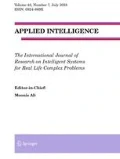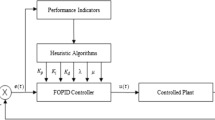Abstract
Fuzzy controllers (FCs) that are based on integer schemes have demonstrated their performance in an extensive variety of applications. However, several dynamic systems can be more accurately controlled by fractional controllers yielding an increased interest in generalizing the design of FCs with fractional operators. In the design stage of fractional FCs, the parameter calibration process is transformed into a multidimensional optimization problem where fractional orders, as well as the controller parameters of the fuzzy system, are considered as decision variables. Under this approach, the complexity of the optimization problem tends to produce multimodal error surfaces for which their respective cost functions are significantly difficult to minimize. Several algorithms based on evolutionary computation principles have been successfully applied to identify the optimal parameters of fractional FCs. However, most of them still exhibit serious limitation since they frequently obtain sub-optimal solutions after an improper equilibrium between exploitation and exploration in their search strategies. This paper presents an algorithm for the optimal parameter calibration of fractional FCs. In order to determine the best parameters, the proposed method uses a new evolutionary method called Social Spider Optimization (SSO), which is inspired on the emulation of the collaborative behavior of social-spiders. In SSO, solutions imitate a set of spiders, which cooperate to each other by following the natural laws of a cooperative colony. Unlike most of the existing evolutionary algorithms, the method explicitly evades the concentration of individuals in the best positions, avoiding critical flaws such as the premature convergence to sub-optimal solutions and the limited balance of exploration-exploitation. Numerical simulations have been conducted on several plants to show the effectiveness of the proposed scheme.








Similar content being viewed by others
References
Oldham KB, Spanier J (1974) The fractional calculus: theory and application of differentiation and integration to arbitrary order. Academic Press, New York
Podlubny I (1999) Fractional differential equations. Academic Press, San Diego
Das S, Pan I, Das S, Gupta A (2012) A novel fractional order fuzzy PID controller and its optimal time domain tuning based on integral performance indices. J Eng Appl Artif Intell 25:430–42
Delavari H, Ghaderi R, Ranjbar A, Momani S (2010) Fuzzy fractional order sliding mode controller for nonlinear systems. Commun Nonlinear Sci Numer Simul 15(4):963–78
Isabel SJ, Ramiro SB (2015) Genetic optimization of fuzzy fractional PD + I controllers. ISA Trans 57:220–230
Barbosa RS, Jesus IS A methodology for the design of fuzzy fractional PID controllers. In: ICINCO 2013 - Proceedings of the 10th International Conference on Informatics in Control, Automation and Robotics, Volume 1, 2013, Pages 276–281
Zadeh LA (1965) Fuzzy sets. Inf Control 8:338–353
Yingdong H, Huayou C, Zhen H, Ligang Z (2015) Multi-attribute decision making based on neutral averaging operators for intuitionistic fuzzy information. Appl Soft Comput 27:64–76
Indranil P, Saptarshi D (2016) Fractional order fuzzy control of hybrid power system with renewable generation using chaotic, P S O. ISA Trans 62:19–29
Roy GG, Chakraborty P, Das S (2010) Designing fractional-order PI λ D μ controller using differential harmony search algorithm. International Journal of Bio-Inspired Computation 2 (5):303–309
Xu Y, Zhou J, Xue X, Fu W, Zhu W, Li C (2016) An adaptively fast fuzzy fractional order PID control for pumped storage hydro unit using improved gravitational search algorithm. Energy Convers Manag 111:67–78
Sharma R, Rana KPS, Kumar V (2014) Performance analysis of fractional order fuzzy PID controllers applied to a robotic manipulator. Expert Systems with Applications 41:4274–4289
Tan KC, Chiam SC, Mamun AA, Goh CK (2009) Balancing exploration and exploitation with adaptive variation for evolutionary multi-objective optimization. Eur J Oper Res 197:701–713
Chen G, Low CP, Yang Z (2009) Preserving and exploiting genetic diversity in evolutionary programming algorithms. IEEE Trans Evol Comput 13(3):661–673
Cuevas E, Cienfuegos M, Zaldívar D, Pérez-Cisneros M (2013) A swarm optimization algorithm inspired in the behavior of the social-spider. Expert Systems with Applications 40(16):6374–6384
Goldberg DE (1989) Genetic Algorithm in Search Optimization and Machine Learning. Addison-Wesley
Kennedy J, Eberhart R (1995) Particle swarm optimization. In: Proceedings of the 1995 IEEE International Conference on Neural Networks, vol 4, pp 1942–1948
Geem ZW, Kim J, Loganathan G (2001) Music-inspired optimization algorithm harmony search. Simulation 76:60–68
Rashedi E, Nezamabadi-pour H, Saryazdi S (2009) GSA: a gravitational search algorithm. Inf Sci 179:2232–2248
Yang XS, Deb S (2010) Engineering optimization by cuckoo search. Int J Math Model Numer Optim 1 (4):339–343
Pereira DR, Pazoti MA, Pereira LAM, Rodrigues D, Ramos CO, Souza AN, Papa JP (2016) Social-Spider Optimization-based Support Vector Machines applied for energy theft detection. Comput Electr Eng 49:25–38
Mirjalili SZ, Saremi S, Mirjalili SM (2015) Designing evolutionary feedforward neural networks using social spider optimization algorithm. Neural Comput Applic 26(8):1919–1928
Klein CE, Segundo EHV, Mariani VC, dos L, Coelho S (2016) Modified Social-Spider Optimization Algorithm Applied to Electromagnetic Optimization. IEEE Trans Magn 52(3):2–10
Ouadfel S, Taleb-Ahmed A (2016) Social spiders optimization and flower pollination algorithm for multilevel image thresholding: A performance study. Expert Systems with Applications 55:566–584
Tawhid MA, Ali AF A simplex social spider algorithm for solving integer programming and minimax problems. Memetic Computing. In press
Jesus I, Machado J (2007) Application of fractional calculus in the control of heat systems. J Adv Comput Intell Intell Inform 11(9):1086–91
Machado J (1997) Analysis and design of fractional-order digital control systems. SAMS J Syst Anal Modell Simul 27:107– 22
Liu L, Pann F, Xue D (2015) Variable-order fuzzy fractional PID controller. ISA Trans 55:227–233
Shah P, Agashe S (2016) Review of fractional PID controller. Mechatronics 38:29–41
Khazali R (2013) Fractional-orderPI λ Dμ controllerdesign. Computers and Mathematics with Applications 66:639–646
Owolabi KM (2017) Robust and adaptive techniques for numerical simulation of nonlinear partial differential equations of fractional order. Commun Nonlinear SCi Numer Simulat 44:304– 317
Hélie T (2014) Simulation of Fractional-Order Low-Pass Filters. IEEE/ACM Transactions on Audio, Speech, and Language Processing 22(11):1636–1647
Hwang C, Leu J-F, Tsay S-Y (2002) A note on time-domain simulation of feedback fractional-order systems. IEEE Trans Autom Control 47(4):625–631
Podlubny I (1998) Fractional Differential Equations. Acad. Press
Miller KS, Ross B (1993) An Introduction to the Fractional Calculus and Fractional Differential Equations. Wiley
DL (1994) Numerical Models for the Simulation of the Fractional-Order Control Systems. Numer Model Simul Fractional-Order Control Syst
Barbosa R, Machado JA, Silva M (2006) Time domain design of fractional differintegrators using least-squares. Signal Process 86(10):2567–2581
YangQuan C, Vinagre B, Podlubny I (2004) Continued fraction expansion to discretize fractional order derivatives—an expository review. Nonlinear Dyn 38(1–4):155–70
Vinagre BM, Chen Y, Petráš I (2003) Two direct Tustin discretization methods for fractional-order differentiator/integrator. Frankl Inst 340(5):349–62
Jacobs BA (2015) A New Grünwald-Letnikov Derivative Derived from a Second-Order Scheme. Abstr Appl Anal:9. doi:10.1155/2015/952057
Scherer R, Kalla SL, Tang Y, Huang J (2011) The Grünwald–Letnikov method for fractional differential equations. Computers and Mathematics with Applications 62:902–917
Liua H, Lia S, Cao J, Li G, Alsaedi A, Alsaadi FE Adaptive fuzzy prescribed performance controller design for a class of uncertain fractional-order nonlinear systems with external disturbances. Neurocomputing. In Press
Bigdeli N (2015) The design of a non-minimal state space fractional-order predictive functional controller for fractional systems of arbitrary order. J Process Control 29:45–56
Cordón O, Herrera F (1997) A three-stage evolutionary process for learning descriptive and approximate fuzzy-logic-controller knowledge bases from examples. Int J Approx Reason 17(4):369–407
Takagi T, Sugeno M (1985) Fuzzy identification of systems and its applications to modeling and control. IEEE Trans Syst Man Cybern SMC-15:116–132
Mamdani E, Assilian S (1975) An experiment in linguistic synthesis with a fuzzy logic controller. Int J Man Mach Stud 7:1–13
Xu J-X, Li C, Hang CC (1996) Tuning of fuzzy PI controllers based on gain/phase margin specifications and index, ITAE. ISA Trans 35(1):79–91
Author information
Authors and Affiliations
Corresponding author
Rights and permissions
About this article
Cite this article
Cuevas, E., Luque, A., Zaldívar, D. et al. Evolutionary calibration of fractional fuzzy controllers. Appl Intell 47, 291–303 (2017). https://doi.org/10.1007/s10489-017-0899-y
Published:
Issue Date:
DOI: https://doi.org/10.1007/s10489-017-0899-y




